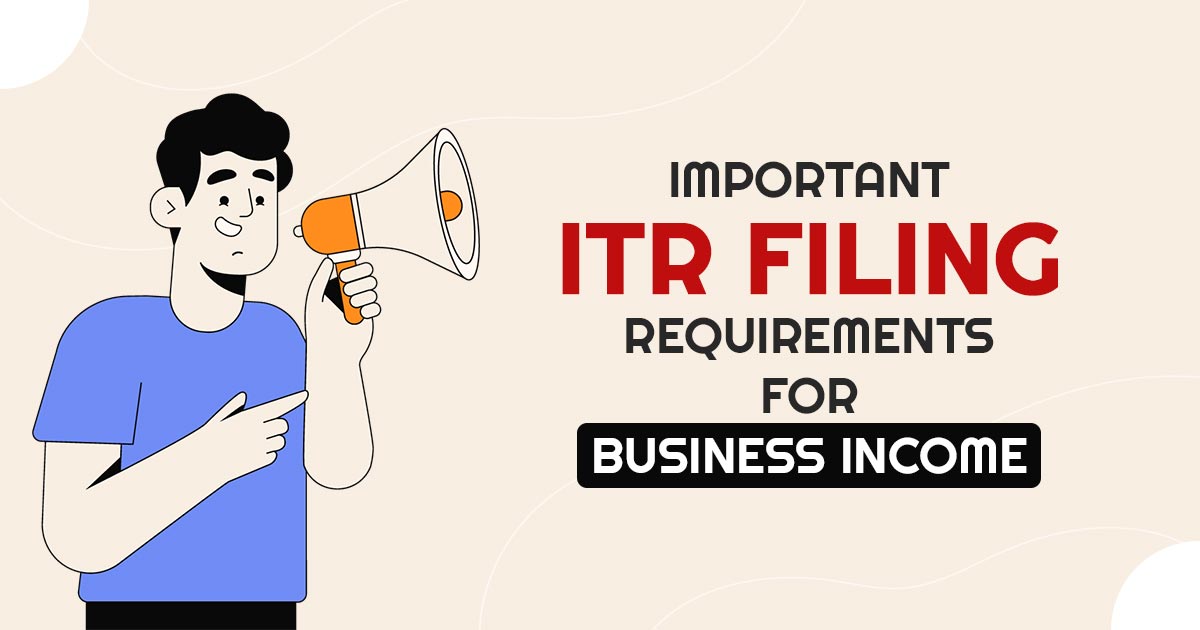
If a person has income from a business in India, then he must understand the ITR filing requirements for business income to avoid interest and penalties.
Business Income and ITR Filing: What You Must Learn
In this blog post, we’ve broken down the key points into an easy-to-follow checklist below.
Income Tax Return (ITR) Form
Using the ITR-3 or ITR-4 (Presumptive Taxation Scheme) form based on your type of business entity and turnover, you ought to file your income tax return.
File ITR Before Deadline
- The deadline for ITR filing for businesses subject to audit is October 31, the year following the tax year. If an individual is not under tax audits, the deadline for filing the tax return is July 31.
10-IEA for Old Income Tax Regime:
- For all assessees, the new tax regime u/s 115BAC is the default. Hence, a taxpayer with income from a business who wishes to switch to the old tax regime should provide Form No. 10-IEA by the ITR due date. The same option once practised could just be withdrawn only once time in the next year.
Keep Records of Book Accounting
- Professionals (for instance, legal, medical, engineering, etc.) and businesses must maintain books of account for income assessment. Maintenance of books of account is obligatory if business income surpasses Rs 1.2 lakh or turnover is more than Rs 10 lakh in any of the preceding 3 years. For individuals/HUF, these limits are increased to Rs 2.5 lakh and Rs 25 lakh, respectively.
Individuals Facing Tax Audits Can Now E-Verify Their ITRs Using an EVC
- A person who is obligated for a tax audit u/s 44AB could now validate the ITR via EVC. Before that, they ought to validate the ITR solely via a digital signature.
In Case of Losses, File Your ITR by the Specified Deadline
- Please remember the following information business losses can be carried forward to offset against the income of subsequent years if the taxpayer files the return of income on or before the due date. However, if the return is filed late, the losses for that year cannot be carried forward to subsequent years.
Income Tax Audit By A Chartered Accountant
- You need to experience a tax audit via a Chartered Accountant if your business turnover is more than Rs 1 crore, and the same limit exceeds Rs 10 cr when the cash receipts along with the payments are lower than 5% of respective transactions. A tax audit shall be needed for the professionals if the gross receipts surpass Rs 50 lakh.
Presumptive Taxation Scheme
- Beneath the presumptive taxation regime, if a person is entitled as an eligible taxpayer in eligible businesses, their profit and gains via business and profession would be regarded to be 8% of gross receipts/ turnover (6 per cent in case of digital receipts).
- The Income Tax Act permits small and medium enterprises to file the tax on presumptive grounds to lessen the burden of compliance. U/s 44AD, resident individuals, Hindu Undivided Families (HUFs), and partnership firms except for limited liability partnerships (LLPs) can use the same scheme if their business turnover or gross receipts do not surpass Rs 2 crore or Rs 3 crore if cash receipts do not surpass 5 per cent of the total.
- As per the scheme, 8% of the total turnover or gross receipts from business is considered presumptive income. But concerning the turnover or receipts, which are obtained via an account payee cheque or bank draft or use of an electronic clearing system via a bank account in the year, the presumptive income on the same part is 6%. Choosing the presumptive taxation scheme waives you from keeping the books of account and performing an audit u/s 44AB.